Road projects ahead, heat-pump program, more @ this year’s first North Highline Unincorporated Area Council meeting
By Tracy Record
White Center Now editor
What didn’t happen at Thursday’s North Highline Unincorporated Area Council meeting was almost as interesting as what did.
NO NEW STOREFRONT DEPUTY YET: The King County Sheriff’s Office wasn’t represented, so the usual crime/safety briefing wasn’t given, because the storefront deputy position isn’t filled yet – and NHUAC has been told they are shortstaffed in other areas so they might not be filling this job any time soon. (We’ll follow up with KCSO on this.) NHUAC’s Barbara Dobkin said she did get a bit of news – there’s an assigned late-night deputy working with businesses to get trespass authorizations so that deputies can take action if there’s late night trouble; about three dozen businesses have signed those authorizations so far.
The biggest briefing of the night was from King County Roads, part of Local Services:
KING COUNTY ROADS: Broch Bender from Roads/Local Service was joined by several colleagues who brought news of White Center road projects. (Here’s the full slide deck, so you can see larger versions of what we show below, and more.)
Roads takes care of 1,500 miles of road! First up, the 16th Avenue 100th to 107th project.
The plan is for bike lanes and 46 parking spaces – a “road diet,” Bender acknowledged. “Studies have shown that putting in bike lanes slows traffic,” Bender noted, saying they got funding so they epect to go to construction this year and. pave while they’re at it. Curb bulbs, bike-lane striping, and the “road diet” are all part of it.
The funding is federal, Bender acknowledged, but – alluding to the chaotic D.C. situation – “right now we do have the funding.” While they’re at it, they’ll be starting with a pipe replacement project starting in early March:
First phase between 15th and 16th on 104th, second phase the north side of the intersection will close for about two weeks, third phase, work between 16th and 17th.
All the work is likely to take four to six weeks.
Other projects in White Center this year – paving on a section of 100th, about 700 feet, plus curb ramp upgrades at 11 spots on Roxbury, 15th and 16th, plus some sidewalk panels on 26th, saving the trees that caused them trouble.
Next part of their presentation was to explain how the Customer Service Request Process works.
Call the Road Helpline for urgent problems at 206-477-8100. Someone answers 24/7. “When you see urgent issues, please don’t email,” because they don’t monitor 24/7. (It was reiterated later, PLEASE call for problems causing trouble on roads and sidewalks.) Email is for things more like overgrown shrubbery,
maint.roads@kingcounty.gov. That box is monitored 8:30-4:30 Mondays-Fridays. NHUAC’s Barbara Dobkin said it’s hard to find out who’s responsible for what; Road said they’ll start figuring that out, If you see a problem in the street, call them.
They showed a list of service requests from recent calls. They also showed a list of ways to stay connected with the department. (Presenters were Shunneia Long-Mattingly and Amy Bresslour).
More Q&A had to do with the 16th SW project. The bike lane won’t have bollards. There’ll be a two-foot buffer lane between the bike lane and the motor-vehicle lane. Also: What about adding sidewalks? Bender said, “What we’re focused on now is keeping our roads in working order.” The recently added sidewalks on 100th were part of Metro’s RapidRide projects. Dobkin observed that improvements all seem to happen on the east side of White Center, and on the west side, “we get nothing.”
One attendee thought that maybe instead of sidewalks, they could put up barriers between asphalt walkways and the rest of the street. Bender said it’s more complicated than that.
Another question: Any speed bumps? Long-Mattingly said king County no longer installs them, because studies have shown they don’t work. Someone else brought up that there are many in Seattle and things seem safer, so why is there such a difference between city and county? Long-Mattingly said she’d look into that.
P.S. They are taking demographic surveys to be sure they’re compliant with federal Title VI- or at least, Title VI as it’s been – you can respond via forms.office.com/g/FZgZuCPd8k
TIM’S TAVERN TO MAKE A CHANGE: Mark Rowe from King County Permitting was there to talk about “what the plan is” for this topic that’s been discussed at many previous NHUAC meetingsii – Tim’s outdoor music – “We’ve worked out an agreement – Tim’s going to be bringing the music inside,” because zoning indeed doesn’t allow for outdoor music, Rowe acknowledged, while noting that the County Council could always change the zoning. By mid-February, they’re going to bring the music indoors, Rowe said. He said the owners have some sewer work to do anyway so installing a small stage inside will be done at the same time. In the previous discussions, it had long been contended that the outdoor music was not allowed under zoning. Rowe underscored that he is not taking sides – he sees both the concerns and also the benefits that Tim’s “brings to the community.” Another resident said it’s not the music itself as the fact “it’s LOUD.” That attendee said they “like music in the community,” but six nights a week of loudness was too much. Why did it take two years to reach this? Rowe said they always try to get to “voluntary compliance” first. “The plan is now the music will move indoors and we’ll see” what happens from there.
Another attendee asked about odors from a laundromat; Rowe suggested reaching out to Puget Sound Clean Air Agency. “They’re the same ones that deal with wood smoke, etc.,” he said.
FREE HEAT-PUMP SYSTEMS! First presentation of the night was about Energize, the King County heat-pump program. (First was a primer explaining that the pumps are both a heating and cooling system.) They’re hoping to install more than 150 in neighborhoods this year – 75 single-family homes, 60 adult family homes, 25 family day cares. “Heat pumps are generally very expensive to install – $20,000+ – the county can fund 80 to 100 percent of the cost” depending on the recipient’s income. Recipients must make less than 100 percent of the AMI. You don’t have to own your home – renters can be eligible too. But there’s a specific geographic area they’re focusing in. The income means less than $77,700 for a one-person household could be eligible for full-cost coverage, less than $116,500 for partial-cost coverage. If you’re interested in applying, they have workshops coming up 2/12 6 pm online for day-care providers, 2/26 6 pm at Seola Gardens Community Center and 2/27 6 pm online. The program’s website is kingcounty.gov/energize – which is also where you’ll find the map tool to see if you’re eligible, as well as info about the upcoming sessions.
NEXT MEETING: The North Highline Unincorporated Area Council usually meets on the first Thursday of the month at the North Highline Fire Station, 1243 SW 112th. We publish the invitations/previews as soon as they’re received, several days in advance.
You can follow any responses to this entry through the RSS 2.0 feed. Both comments and pings are currently closed.

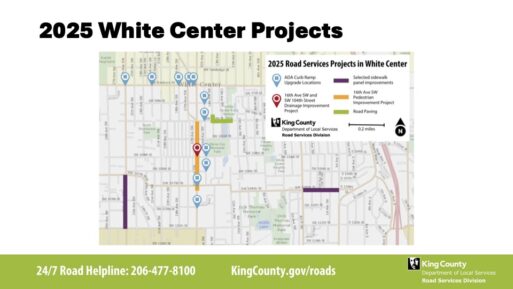
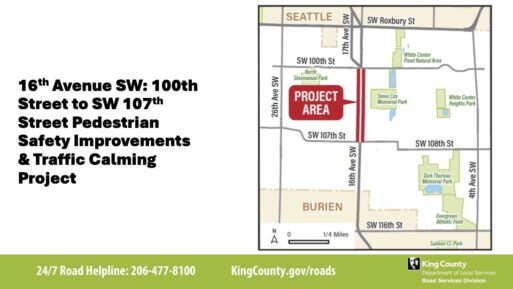
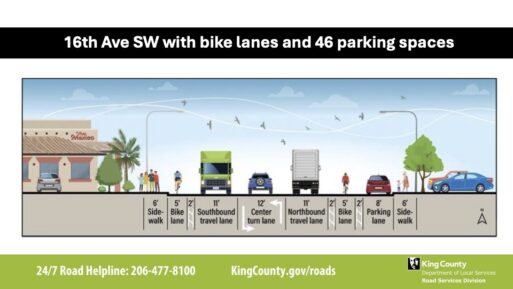
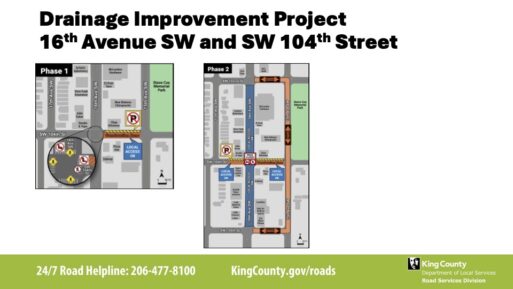
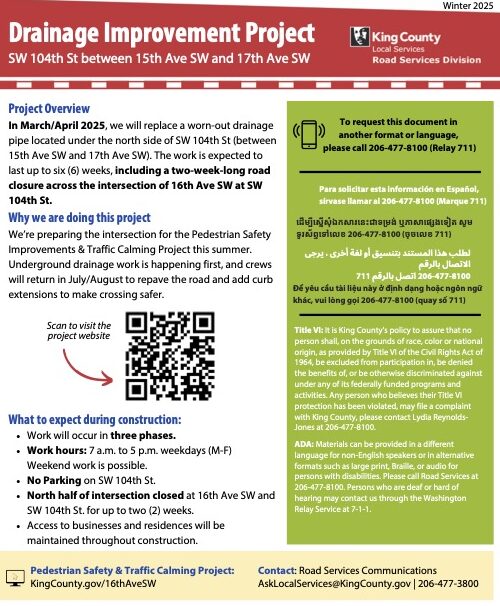
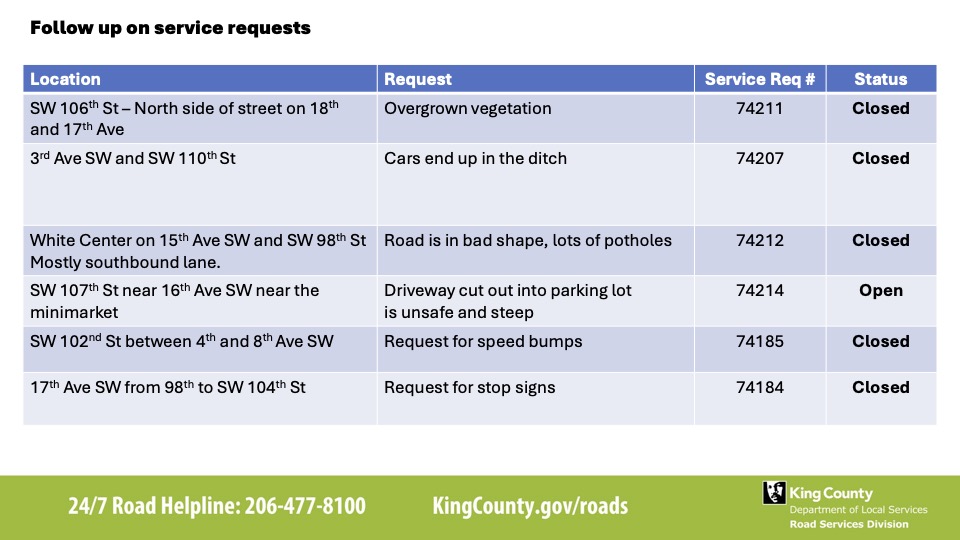
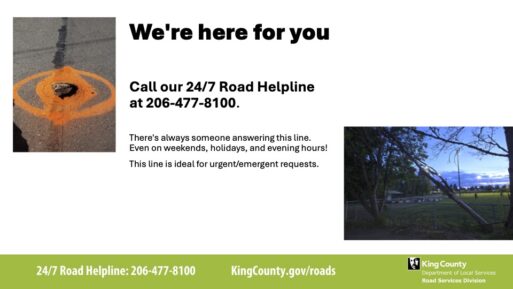
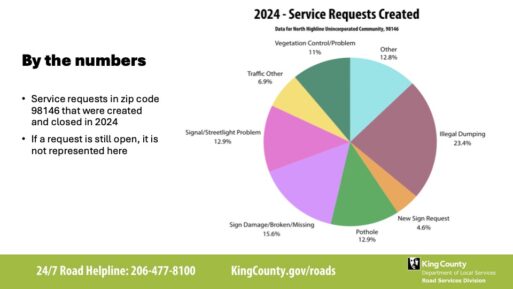
February 9th, 2025 at 1:08 pm
As a person who lives many blocks from Tim Tavern I have to say I’m not at all happy nor impressed about how they are dealing with the loud music that I can hear inside my house with my windows closed. I am getting sick and tired of not being able to enjoy my house and being able to sleep at night. I personally feel that they could care less about how their business has impacted certain people who live around their establishments!